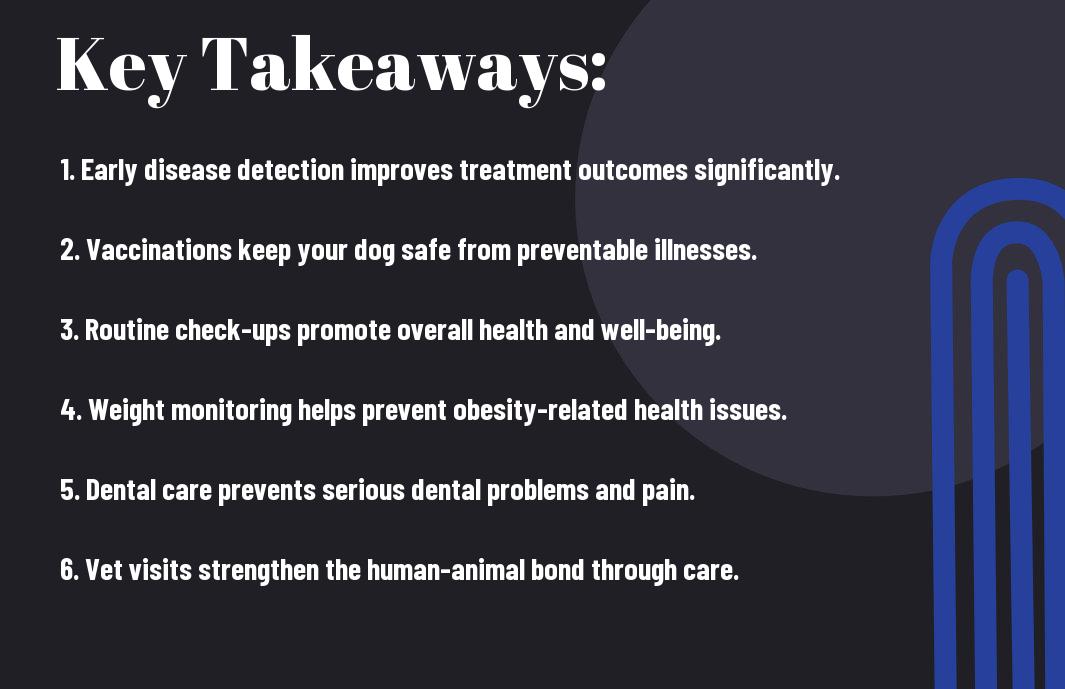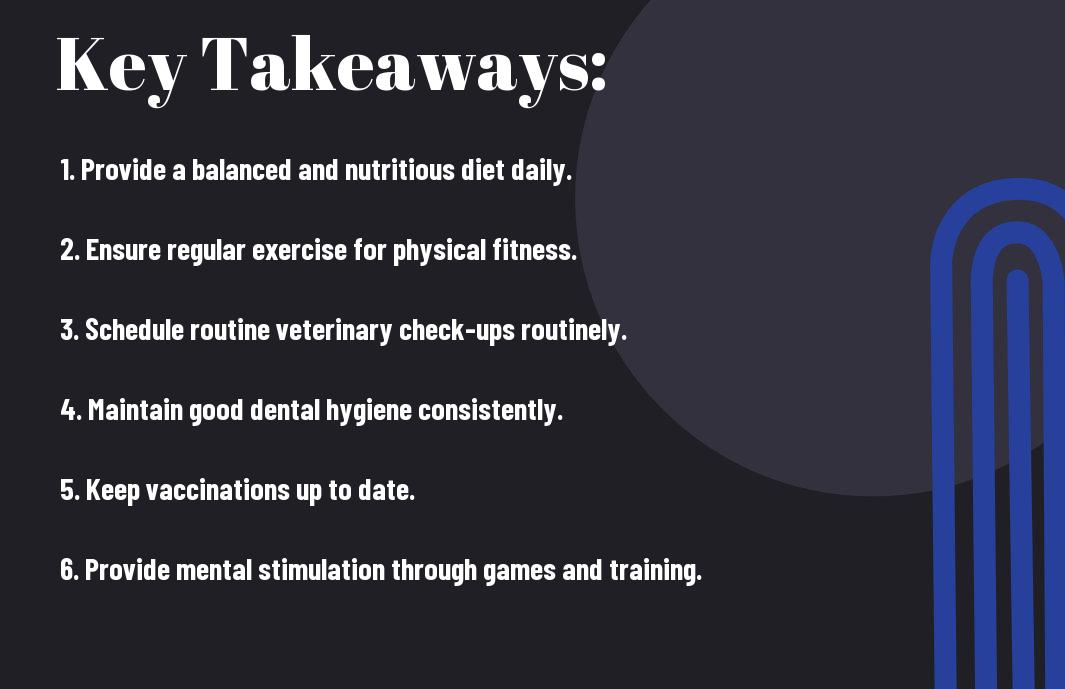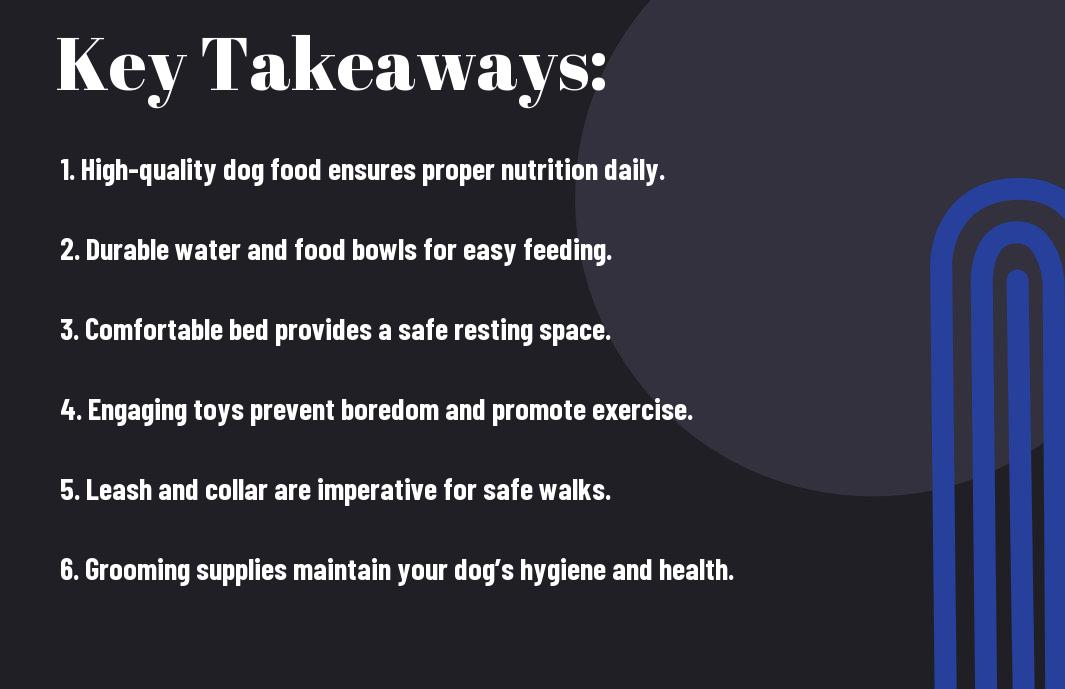Check-ups play a vital role in ensuring your dog remains healthy and happy. By scheduling regular veterinary visits, you can catch potential health issues before they escalate into serious problems. These appointments allow for important and preventive care that protects your furry friend from various diseases. Additionally, your vet can provide insights into your dog’s nutrition, behavior, and overall well-being. Prioritizing these check-ups is an investment in your dog’s long-term health, allowing them to thrive and enjoy life at their best.

Understanding Regular Vet Check-ups
Before you can fully appreciate the significance of regular vet check-ups for your dog, it’s important to understand what these check-ups entail. Regular veterinary visits are appointments where your dog undergoes a thorough examination by a licensed veterinarian. During these visits, the vet assesses your pet’s overall health, including checking vital signs, weight, dental health, and administering preventive care, such as vaccinations and parasite control. These examinations serve as a proactive approach to detect any potential health issues early on, ensuring your dog remains healthy and happy.
Definition of Regular Vet Check-ups
Definition of regular vet check-ups is multifaceted; they provide not only routine health assessments but also help you build a strong relationship with your veterinarian. The veterinarian evaluates various aspects of your dog’s health, addressing any concerns you may have. This process not only aids in preventing diseases but also assists in maintaining your dog’s quality of life through regular monitoring and care.
Recommended Frequency of Check-ups
Regular check-ups are necessary for maintaining your dog’s health. Generally, adult dogs should have a vet visit at least once a year, while puppies and senior dogs may require more frequent visits due to their changing health needs. In addition, some breeds may be predisposed to specific health issues and should be assessed more often to mitigate risks and monitor any developing conditions.
Frequency of these check-ups can greatly influence the longevity and quality of your pet’s life. Depending on various factors, including age, breed, and health status, the recommended frequency might vary. Puppies may need a series of vaccinations and thus require more frequent visits, while healthy adult dogs might only need an annual health assessment. Senior dogs or those with chronic conditions may need to be seen every six months or as advised by your vet.
Types of Veterinary Visits
Types of veterinary visits can generally be categorized into routine check-ups and specialized visits. Routine check-ups often include vaccinations, screenings for parasites, and dental assessments. These visits are designed to catch any potential health issues before they become serious. Specialized visits, on the other hand, may be necessary when your dog is experiencing specific symptoms or health problems, requiring a more in-depth examination and tailored treatment plan.
- Routine Check-ups: Essential for overall health maintenance.
- Vaccination Visits: Protects your dog from infectious diseases.
- Emergency Visits: Provides immediate care in urgent situations.
- Follow-Up Visits: Necessary to monitor recovery from an illness or surgery.
- Specialized Consultations: Needed for specific health concerns.
Considering the various types of veterinary visits ensures that your dog receives the appropriate care they need. Understanding the difference between routine and special visits will help you communicate better with your veterinarian and ensure your pet remains healthy.
| Type of Visit | Description |
| Routine Check-up | Comprehensive health assessment. |
| Vaccination Visit | Administering necessary vaccines. |
| Emergency Visit | Immediate care for urgent health issues. |
| Follow-Up Visit | Monitor recovery post-illness or surgery. |
| Specialized Consultation | Focus on specific health concerns. |
After understanding the different types of veterinary visits, you can better plan your dog’s health care regimen. Regular vet check-ups not only help to identify health concerns but also contribute to your dog’s overall well-being, ensuring they live a long and happy life.
Benefits of Regular Vet Check-ups
Not only do regular vet check-ups help ensure your dog leads a happy life, but they also come with numerous benefits that can significantly impact your pet’s health and well-being. Establishing a routine visit schedule allows veterinarians to assess your dog’s overall health and implement tailored care plans. The advantages go beyond a simple examination and vaccinations, encompassing a holistic approach to your dog’s needs.
Early Detection of Health Issues
An early detection of potential health issues can mean the difference between a treatable condition and a serious one. Regular check-ups allow veterinarians to spot subtle changes in your dog’s health that you may not notice at home. From early signs of diabetes to underlying heart conditions, these visits enable your vet to recommend immediate interventions or lifestyle adjustments, significantly improving your dog’s prognosis.
Additionally, many health conditions are asymptomatic in their early stages, meaning your dog may not show obvious signs of illness until the condition has progressed. By consistently bringing your dog in for check-ups, you ensure that any potential problems are identified and addressed promptly, leading to better outcomes and prolonged quality of life.
Preventive Care and Vaccinations
Against common illnesses and diseases, preventive care and vaccinations are vital components of your dog’s healthcare regimen. Regular vet visits ensure your dog stays up-to-date on vaccinations, which serve as the first line of defense against infectious diseases that can be harmful or even fatal. Vaccinations also help prevent the spread of diseases in the wider canine community, promoting a healthier environment for all dogs.
Health check-ups are also a perfect opportunity for your vet to discuss any additional preventive measures, such as flea and tick prevention, heartworm testing, and other crucial treatments. Addressing these preventive aspects helps guard your dog against potential health risks before they manifest.
Nutritional Guidance and Weight Management
Vaccinations play a critical role in safeguarding your dog’s health, but they are not the only aspect of preventive care. Maintaining proper nutrition and a healthy weight is equally important. Regular vet visits provide you the chance to get personalized nutritional guidance tailored to your dog’s specific needs, breed, age, and activity level. Your veterinarian can help you choose the right diet and portion sizes, preventing obesity and related health issues that may arise from an imbalanced diet.
A healthy body weight will not only reduce the risk of serious health conditions like diabetes and joint problems but will also enhance your dog’s overall vitality and happiness. Regular consultations allow you to adjust feeding routines and exercise regimens, ensuring your furry friend remains fit and energetic.
Dental Health Maintenance
Maintenance of your dog’s dental health is often overlooked but holds immense significance. Regular vet check-ups allow for thorough dental evaluations that can detect issues like periodontal disease and tooth decay before they escalate. Your veterinarian can provide dental cleanings and treatments necessary to ensure your dog’s mouth remains healthy, which is critical for their overall well-being.
This emphasis on dental care helps prevent plaque buildup, gum disease, and tooth loss while also reducing the risk of bacteria entering your dog’s bloodstream, which can affect vital organs. Good dental hygiene contributes not only to a bright smile but also to a longer, healthier life for your pet.
Common Health Issues Addressed During Check-ups
Once again, emphasizing the importance of regular vet check-ups allows you to catch potential health issues before they develop into serious problems. Your veterinarian will assess your dog’s overall health to identify any early signs of conditions that might be affecting them. By staying informed about these common health issues, you can help ensure your dog lives a long and healthy life.
Parasite Control
Above all, parasite control is a vital aspect that veterinarians focus on during check-ups. Dogs can be afflicted by a range of parasites, including fleas, ticks, and intestinal worms, which can lead to severe health complications if left untreated. Regular check-ups allow your vet to perform diagnostic tests and recommend appropriate preventive treatments tailored to your dog’s lifestyle.
Additionally, keeping your dog on a regular parasite prevention program not only protects their health but also helps prevent these pests from affecting your home environment. Your vet can provide information on the best options available, including topical treatments, oral medications, and vaccinations, ensuring your furry friend remains protected year-round.
Skin and Coat Conditions
One common concern that often surfaces during veterinary exams is skin and coat conditions. Your vet will examine your dog’s skin for signs of allergies, infections, or irritations that might require intervention. These conditions can stem from various sources, such as food allergies, environmental allergies, or underlying health issues, and addressing them early can lead to peace of mind for you and relief for your dog.
Control of skin and coat conditions is imperative for your dog’s comfort and overall well-being. When you notice changes in your dog’s skin or coat, such as excessive itching or unusual bald spots, bringing these concerns to your vet’s attention can prevent more extensive treatment later on. Early diagnosis and management can make all the difference in your dog’s quality of life.
Joint and Mobility Problems
Addressed during routine exams, joint and mobility problems can significantly affect your dog’s ability to enjoy daily activities, such as playing and exercising. Conditions like arthritis, hip dysplasia, or other orthopedic issues can manifest gradually, making it imperative to discuss any changes in your dog’s mobility with your vet. They can evaluate your dog’s joints and muscles to determine the right interventions.
A proactive approach to joint and mobility problems can involve lifestyle changes, dietary adjustments, or even medications that help manage pain and inflammation. By collaborating with your veterinarian, you can create a tailored plan that improves your dog’s mobility while ensuring they stay active and engaged.
Heart and Respiratory Health
Health issues related to the heart and respiratory system are among the most serious conditions that can affect your dog. Routine veterinary check-ups often involve heartworm testing and assessments of lung function, ensuring that any early warning signs are detected and addressed promptly. Symptoms such as coughing, difficulty breathing, or lethargy should be reported to your veterinarian immediately, as these can indicate serious health issues.
To maintain your dog’s heart and respiratory health, monitoring their weight and diet is crucial. Regular vet visits enable your veterinarian to assess your dog’s heart rate and lung sounds, offering insights into their cardiovascular and respiratory status. By staying vigilant and making informed decisions, you can help your furry friend lead a healthier, more active life.
Preparing for Your Dog’s Vet Visit
Many dog owners often overlook the importance of preparation before heading to the vet, yet it can significantly enhance the experience for both you and your furry friend. Ensuring that you are well-prepared can help the veterinarian provide the best care possible, as they will have a clear understanding of your dog’s health history and concerns. This preparation may involve some simple steps that can make the appointment smoother and more efficient.
Gathering Relevant Health Information
Any time you schedule a vet appointment, it’s crucial to gather relevant health information regarding your dog. This includes documenting any recent changes in your dog’s behavior, eating habits, or physical condition, such as weight loss or lethargy. Additionally, be prepared to inform the vet about your dog’s vaccination history and any previous medical treatments they may have received. This information can provide invaluable context for the veterinarian and aid in accurate diagnosis and treatment.
Also, if your dog is on any medications or dietary supplements, make sure you have those details ready as well. This helps the vet assess any potential interactions and provides a comprehensive view of your dog’s health. Having a well-organized record can also save time during your appointment, allowing you to focus on your dog’s wellness.
Creating a List of Concerns or Questions
List your concerns or questions for the vet prior to the visit, as this can streamline your conversation and ensure you don’t forget any important points. Whether it’s a specific symptom you’ve noticed or general health concerns about your dog’s diet and exercise, jotting these down can help you articulate your worries effectively. This will also give the veterinarian a better idea of your priorities during the visit.
Preparing for this part of the visit can be instrumental in ensuring nothing gets overlooked. Prioritize your concerns based on urgency, and be open to any advice the veterinarian may offer. This proactive approach can significantly enhance the quality of the information exchanged during your appointment.
Ensuring Your Dog’s Comfort and Safety
On the day of the vet visit, make sure to ensure your dog’s comfort and safety. This can involve familiarizing them with the car ride, using a secure pet seatbelt, or a crate to keep them safe during the journey. It’s also wise to bring a familiar blanket or toys to create a sense of security. If your dog tends to get anxious at the vet, consider arriving a bit earlier to allow them to adjust to the new environment.
Additionally, if your dog has a history of aggressive behavior, it’s important to discuss this with your veterinarian beforehand, so they can take the necessary precautions during the examination. Your dog’s comfort and safety should be the top priority, and establishing familiarity with the vet clinic can help reduce anxiety for both of you during visits.
Gathering all relevant information, including health records and concerns, and ensuring your dog’s safety, creates a positive environment for your vet visit. This preparation allows you and your dog to make the most out of each appointment.

Understanding the Veterinary Examination Process
For every pet owner, understanding the veterinary examination process is necessary to ensure the ongoing health and wellbeing of your dog. When you take your furry friend to the vet, it’s not just about a quick check-up; it’s a comprehensive assessment that helps catch potential health issues before they escalate. By familiarizing yourself with this process, you can contribute positively to your dog’s healthcare journey and ensure you address any concerns with your veterinarian effectively.
Initial Assessment and Health History
The first step in the examination process often begins with an initial assessment, which includes a thorough review of your dog’s health history. This involves gathering information about your dog’s previous illnesses, vaccinations, medications, and any known allergies. This data is vital for the veterinarian as it provides a foundation for understanding your dog’s overall health and any potential risks. Providing accurate and detailed information will significantly aid the vet in evaluating your dog’s current state and determining any necessary actions.
Additionally, be prepared to discuss any behavioral changes or symptoms you’ve noticed in your dog. These observations can be indicative of underlying health issues, and sharing them with your vet allows for a more tailored examination approach. Each detail you provide can help in crafting a care plan that addresses your dog’s unique needs.
Physical Examination Techniques
Physical examination techniques are another integral part of the veterinary evaluation process. This typically involves a hands-on assessment where the veterinarian examines your dog’s body systematically. The vet will check vital signs such as heart rate, respiratory rate, and temperature while also observing your dog’s body condition, coat quality, and overall demeanor. These assessments give insights into your dog’s health, allowing the veterinarian to spot any abnormalities that could indicate health issues.
At this stage, the vet may also check your dog’s eyes, ears, teeth, and skin for any signs of problems. They might perform palpations to detect any unusual lumps or masses. Such physical aspects can reveal a lot about your dog’s health status and help in the early detection of conditions before they become serious.
In addition to the initial examination, your veterinarian may employ various diagnostic techniques like blood tests, urinalysis, or imaging studies, depending on the findings during the physical examination. These tests aim to provide definitive answers regarding your dog’s health and help in formulating an effective treatment plan if necessary.
Diagnostic Tests and Procedures
For more thorough insights into your dog’s health, diagnostic tests and procedures may be performed. Your veterinarian may recommend routine blood work to assess organ function, electrolyte levels, and check for infections or diseases. Urinalysis is another common test that can provide necessary information about your dog’s urinary system and overall metabolic state. These additional measures can identify potential health issues that may not be immediately obvious during the physical examination.
Furthermore, in some cases, your vet may suggest imaging techniques like X-rays or ultrasounds. These imaging procedures allow for a non-invasive look inside your dog’s body, revealing any underlying issues in the organs and tissues, thereby enhancing your veterinarian’s ability to diagnose and treat your dog accurately.
Examination processes include these diagnostic tests to ensure a comprehensive understanding of your dog’s health. They serve as a backbone for making informed decisions about your dog’s care and ensuring that any required treatments or interventions are timely and effective.

The Role of Pet Owners in Maintaining Health Post-Check-up
To ensure your dog’s health is maintained after a veterinary check-up, it is necessary for you to take an active role in their ongoing care. This means understanding and adhering to the vet’s recommendations, whether these include dietary changes, medications, or specific exercise regimens. Post-checkup, you should create a tailored plan that incorporates these recommendations while considering your dog’s preferences and lifestyle. This will not only improve their overall well-being, but also >help prevent potential health issues from developing in the future.
Following Vet Recommendations
Post-checkup, following the vet’s recommendations is vital for the health of your dog. It might be as simple as adjusting their diet to include more nutritious options or as complex as administering specific medications for chronic conditions. Taking the time to understand the reasoning behind these recommendations can empower you, ensuring you make informed decisions that benefit your dog’s health.
In addition, consistency is key. Offering a balanced diet, providing recommended supplements, and adhering to prescribed exercise routines will promote your dog’s vitality and happiness. If you find that you have questions or concerns about implementing these suggestions, don’t hesitate to reach out to your veterinarian for clarification and guidance.
Monitoring Health Changes and Behaviors
After a vet check-up, it is necessary to be vigilant in monitoring your dog’s health changes and behaviors. This means being aware of any shifts in appetite, energy levels, or habits that could indicate an underlying issue. By observing your dog meticulously, you can catch potential health problems early, leading to timely interventions that could significantly enhance their quality of life.
This vigilance also allows you to recognize normal behavior patterns, making it easier to spot when something is off. Whether your dog shows signs of lethargy, becomes less social, or develops unusual habits, maintaining a keen eye on their everyday behavior is vital. Keeping a journal of these observations can also be beneficial during your next veterinary visit, as it provides your vet context and specifics about any changes.
Keeping Scheduled Follow-up Appointments
Keeping scheduled follow-up appointments is a vital part of ensuring your dog remains healthy post-check-up. Those visits are not merely routine; they provide an opportunity to reassess your dog’s condition based on the treatments and recommendations provided during the last visit. Regular check-ups can identify any potential issues before they escalate, and help ensure that your dog’s health remains on track.
But, it’s not just about attending appointments; you should actively engage with your veterinarian during these visits. Discuss your observations regarding your dog’s health, any changes you’ve noted, and seek advice on how to improve or maintain their well-being. Being proactive in your communications with your vet can foster a stronger partnership in your dog’s healthcare, ultimately leading to a happier, healthier life for them.
Final Words
To wrap up, regular vet check-ups for your dog are important for ensuring their long-term health and well-being. These appointments allow your veterinarian to identify any potential health issues early on, providing you with the opportunity to address them before they escalate into serious problems. By maintaining a routine schedule of vet visits, you not only keep your dog up-to-date on vaccinations and preventive care but also receive tailored advice on nutrition, exercise, and lifestyle changes that may be necessary as your dog ages.
Additionally, your dog’s behavior, weight, and dental health can significantly impact their overall quality of life. A trusting relationship with your veterinarian can provide peace of mind and enable you to tackle any concerns you may have regarding your pet. Proactive care through regular check-ups empowers you to be an attentive and informed pet owner, ensuring your furry friend enjoys a happy, healthy life. Make it a priority to prioritize these visits, and you’ll be taking a significant step towards safeguarding your dog’s health.
Q: Why are regular vet check-ups necessary for my dog’s health?
A: Regular vet check-ups play a vital role in maintaining your dog’s overall health. These visits allow veterinarians to assess your dog’s physical condition, identify any potential health issues early, and provide preventive care. Routine examinations can help catch problems such as dental disease, obesity, and skin conditions before they become serious. Additionally, vaccinations, parasite control, and dental cleanings are often included in these visits, protecting your dog from common illnesses and maintaining their well-being.
Q: How often should I take my dog for vet check-ups?
A: The frequency of vet check-ups typically depends on your dog’s age, health status, and lifestyle. Generally, puppies should have check-ups every 3 to 4 weeks until they are about 16 weeks old, while adult dogs can usually go once a year for a wellness visit. Senior dogs or those with specific health issues may require more frequent visits to monitor their condition and make timely adjustments to their care. Consult your veterinarian for personalized recommendations based on your dog’s unique needs.
Q: What can I expect during a vet check-up for my dog?
A: During a vet check-up, your veterinarian will conduct a comprehensive examination of your dog, which includes checking their weight, heart rate, breathing, and overall physical condition. They may also evaluate your dog’s coat, skin, ears, and eyes. Depending on the findings, your vet may recommend additional tests such as blood work or urinalysis. The appointment is also an excellent opportunity to discuss any concerns you might have regarding your dog’s behavior, diet, or lifestyle, as well as to receive advice on vaccinations and preventive care options.










